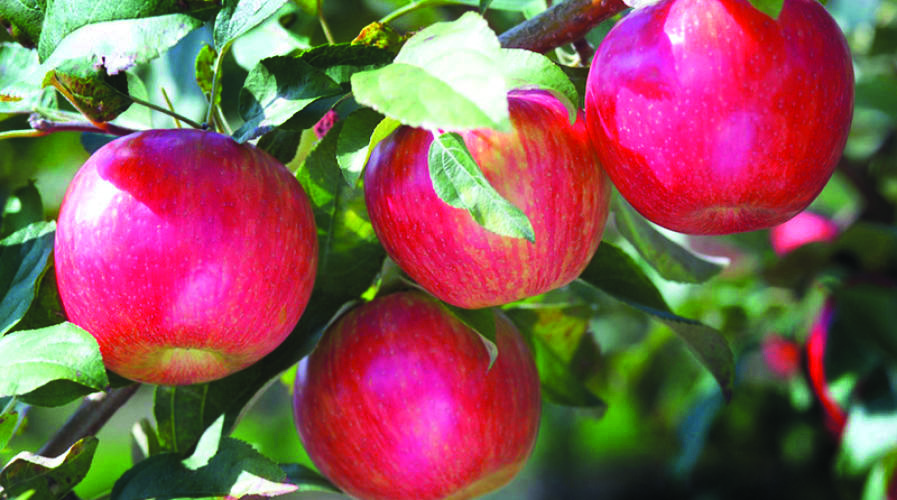
The “edible forest” proposal includes 75 apple trees along with apricot, pear and plum, and three kinds of berries.
Nancy Edmonds Hanson
What would you think of an orchard for all – an “edible forest” where the public could browse and nibble apples, apricots, pears, plums and a bevy of berries? The Moorhead Resiliency Task Force wants to know. If enough locals approve, it could take root at M.B. Johnson Park as early as April.
The edible forest is one pilot project dreamed up by the Resiliency Task Force, a group representing 19 local organizations, ranging from the city, its colleges and school system to the Afro American and Kurdish development associations, Cass-Clay Food Partners, Moorhead Business Association and River Keepers. Prompted by discussions of Concordia College’s climate-minded Sustainability Council, more than 40 individuals have been meeting regularly for more than a year to review Moorhead’s resiliency – its ability to adapt and thrive even while encountering uncertainty, stressors and shocks, from the mega issue of climate change to the immediate challenge of the Covid-19 pandemic.
Ken Foster, the chair of Concordia’s political science department, heads the task force. He defines “resiliency” as “the ability of the community to survive disruption – to anticipate, adapt and flourish in the face of change.”
He adds, “Resiliency isn’t just about bouncing back. It means moving through challenges with strength. It means finding the ability to flourish despite them … absorbing the energy and using it to move forward.”
The task force is rooted in an initiative of President Bill Craft’s, who in 2011 signed onto a national initiative to address climate change concerns. The college committed to reducing carbon emissions and increasing resilience. “Even if we reduce carbon, it will have and is already having an impact on our world, notes Ken, who chairs the campus group. “We also have to prepare for coming disruptions and impacts on the climate, political strife and social disruption.
“It wasn’t meant to be a Concordia thing or a top-down approach. In Fall 2018, we reached out to leaders of all kinds of groups in the community,” he says. The response was enthusiastic. A few months later, the city’s new mayor, Johnathan Judd, declared that “it fits in Moorhead’s DNA.”
Though in-person meetings have been thwarted by the pandemic, the task force has forged ahead to develop a playbook of practical things that Moorhead can do. Five study areas have been identified: Social equity; health and wellness; infrastructure; ecosystem services; and economic health and preparedness.
With the help of a $207,000 Bush Foundation community innovation grant in November 2019, the work groups have come up with three pilot projects. The edible orchard proposal, originally floated by city forester Trent Wise in the ecology group, is the newest.
The first pilot project was suggested by Cani Aden of the Afro American Development Foundation, who raised the issue of pandemic-related health information among New Americans of Somali and Sudanese descent. The grant funded a public health trainer who worked in the Twin Cities with those populations, who came here to educate volunteers in how to reach out to the community in making sure they got accurate information. “It led to good outcomes,” Ken says, “including a good conversation with Clay County Public Health and others in the community.”
The second project, also carried out last summer, brought in a part-time coordinator to support the Moorhead Community Gardening Project. Existing gardens at First Presbyterian Church and Moorhead Public Housing were expanded for community members to grow their own healthy food.
The edible forest project, if approved by citizens and the city council, would add extensive plantings in an open field at Johnson Park that abuts a stormwater pond. Volunteers – perhaps grade-school children working with experienced River Keepers supporters – would plant a literal forest of 75 apple trees, 14 apricot, 12 pear and 15 plum, along with 15 each of aronia berry, honeyberry and juneberry bushes, plus evergreen plantings.
Plans for teaching about the groundwater system are still being developed, according to working group member Christine Holland of River Keepers. The group is talking to the forestry department about possible plantings of native species to increase the forest’s already-substantial habitat for pollinators. It also offers an opportunity to teach about the rain retention ponds around the city that collect precipitation, filter it naturally, and eventually aid its return to the river, where it supplies the community’s drinking water.
The city is inviting residents to comment on the edible forest proposal in an online survey introduced last Friday. The questionnaire, which will be live through Jan. 15, is at cityofmoorhead.com; search for “community planting survey.”


